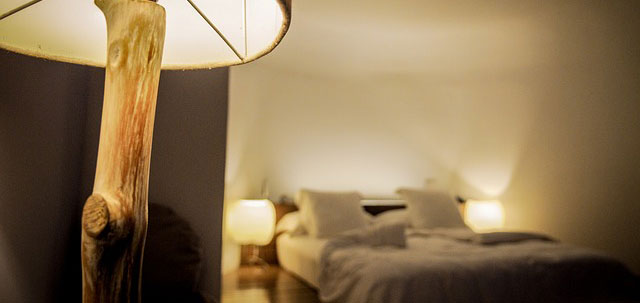[vc_row row_type=”row” use_row_as_full_screen_section=”no” type=”full_width” text_align=”left” css_animation=”” box_shadow_on_row=”no”][vc_column][vc_column_text]
- Your room and your bed should be peaceful, inviting, calming and very comfortable. Clear all clutter and place some of your favorite lovely items in the room. Be sure your bed and your pillow are comfortable and that your room is dark, quiet and a proper temperature. If you tend to get warm at night while sleeping, be sure to keep the temperature of your home cooler at night when you sleep. Use white noise if you live in a home where noises can be heard.
- Avoid seeing any light during the night. If you have an electric alarm clock or night-light, consider disconnecting. If you do wake in the middle of the night (possibly to use the rest room), try not to turn on any lights or look at a lighted clock or night-light. Having light enter your eyes will reset your melatonin, which is your critical sleep hormone.
- Try to go to bed and wake near to the same time every day. Building a sleep pattern that becomes your natural clock is helpful. Getting to bed by around 10:00pm has been found by experts to be ideal. The sleep you experience between 10:00pm and 12:00pm have been found to be the most healing.
- Waking naturally without an alarm clock, once you build a comfortable sleep schedule, is preferred. If you need an alarm clock to awake, it means you have not gotten enough rest.
- Drink water upon waking and try to drink most of your recommended 8 – 10 glasses of water during the day between meals. This may help prevent the need to drink fluids late in the evening, which often cause one to wake up to use the bathroom.
- Exercise during the day, preferable outside in the daylight or fresh air, will help to encourage sound sleep at night. Getting a bit of vitamin D from the sun, several times a week, is helpful overall for good health and strong bones. Walking briskly is a good and simple form of exercise. The natural weight bearing that occurs on the legs and hips will keep those bones strong and joints flexible. Yoga is also a good exercise to exert energy as well as calm the mind.
- Naps of 10 – 20 minutes during the day are helpful. Don’t hesitate to rest mid day if you have the time.
- Try not to eat an hour or so before bedtime. Eating late heavy meals can disrupt sleep and is not good for proper digestion. The heaviest meal of the day should be mid day, when your digestion is naturally the strongest. Avoid all processed foods and refined sugar, if possible, throughout the day.
- Spend the last hour before bed in a quiet restful way, possibly reading or doing something calming. A warm bath before bed works wonders as well. Try to avoid working in front of the computer or watching the TV right before bed. It takes a bit of time for the mental stimulation you receive from this to be reduced.
- Praying or meditating, or doing something mentally and emotionally relaxing to calm your mind, will help to remove any stress from the day. Yoga and deep breathing exercises are also helpful for relieving stress. Repeating a word or a phrase that is pleasing (called a mantra) will quiet your mind. Consider taking a moment to have gratitude for your day or things in your life. Writing in a gratitude journal before bed helps to ease the mind of any stress.
- Be sure to avoid caffeine or alcohol as both have been proven to disrupt sleep patterns. Eating dark chocolate or something very high in sugar late in the day will disrupt sleep as well.
- Consider natural sleep aids such as valerian, which is a sedative. Take 1 -2 capsules ½ hour before bedtime. We have an excellent natural valerian supplement. If you are interested, contact Janet at janet@sanaview.com or by calling (724) 417-6695.
- Consuming cherries or drinking tart cherry juice in the evening has been found to help people not only fall asleep but stay asleep longer during the night.
- Use lavender essential oils either in your bath or bedroom to help relax. J. McKee can help make specific suggestions on how to use lavender effectively. Consider a foot massage with oils to help relax.
- Consider taking 400 – 800 mg of a good absorbable magnesium supplement. (Actually, eating more of a plant-based diet will increase your magnesium intake naturally.) Lower the dose if loose bowels occur and do not take if you have kidney disease.
- Melatonin is a hormone that regulates sleep. Consider taking 2.5mg before bedtime. Some individuals do not do as well with melatonin as they do with tryptophan. Please see next point.
- Consider taking Tryptophan. Serotonin (a neurotransmitter) is synthesized via Tryptophan. Serotonin, in turn, can be converted to melatonin, which is the sleep hormone. 5-htp is another form to consider taking as a supplement.
The most important thing is to not obsess about sleeping. Just relax and know that improvements will be experienced over time with these suggestions. Sleeplessness is troublesome, but not directly life threatening.[/vc_column_text][/vc_column][/vc_row]

